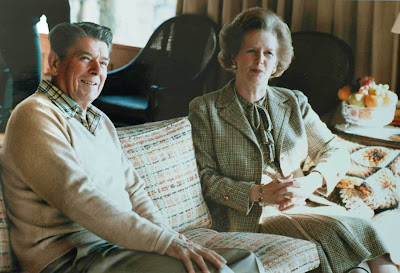Even more amazing, that admiration is about the level of intelligence – or at least cunning – he’s shown. That’s surprising because I’ve come to think of him as one of the dumbest politicians around. Isn’t it odd how the Republican Party has managed to outdo itself each time it’s won the White House recently, following an accelerating downward trajectory?
It’s clear these days that Reagan was already suffering from the Alzheimer’s that fully declared itself after he stepped down. George H. W. Bush was staggeringly incoherent. Dubya needed documents summarised for himself, presumably using short words only. And now Trump’s smartest comment on the presidency was that it turns out to be harder than he thought (“I thought it would be easier”).
What a brilliant insight that is.
Against that setting, you just have to pause in at least a little wonder at the way he’s handled the firing of James Comey as Director of the FBI.
 |
| Trump and Comey: a drama of craftiness. Nastiness too |
Follow the steps carefully.
First Comey revealed, on 28 October 2016, that the FBI was investigating another batch of e-mails of Hillary Clinton’s to establish whether they were evidence of a criminal act. 28 October. The election took place on 8 November, just eleven days later. On 6 November, he announced that there were no grounds for a prosecution – but that was only two days before the election and the damage was done.
The fault for losing was certainly Hillary’s, for a poorly run campaign, but there’s no doubt that Comey nailed her coffin lid shut: without his intervention, states like Florida, Michigan, Wisconsin and Pennsylvania which Trump won by excruciatingly tight margins, might have tipped into her camp and her victory in the popular vote would have been turned into a victory overall, giving her the White House.
But then Comey turned on the man he’d helped elect. He let it be known that the FBI was actively investigating links between the Trump campaign and the Russian secret services. However enthusiastic it was about the 28 October revelations, the Trump administration was unlikely to be quite as pleased about these ones.
It’s hard to grasp what Comey could have been about. Was he trying to be even-handed? If so, it turned out to be misguided.
Next Comey appeared before the Senate Judiciary Committee on 3 May and gave blundering testimony which had to be “clarified” (i.e. corrected) later.
Now comes the final act. This is where Trump displayed his cunning. On 9 May, Trump fired Comey – but not for the Russia investigation. Oh, no. For his actions in the Clinton case.
Talk about win-win. Trump gets the bump eleven days out from the election that the revelations provided. Then he can use exactly those revelations to fire the man that made them, when he became embarrassing in turn.
Pretty cunning, isn’t it? Low cunning, maybe, but cunning all the same.
Except, of course, if I can see through it, so can most people. It’s a pretty crass manoeuvre obviously guided by pure self-interest. And whatever Trump does, the pressure on him isn’t going to let up. In fact, the pressure keeps growing precisely because of what Trump does.
Not cause for all that much admiration, then. But when you’re talking about Trump, you don’t wonder about how much admiration you can have for him. You wonder at feeling any admiration at all.




